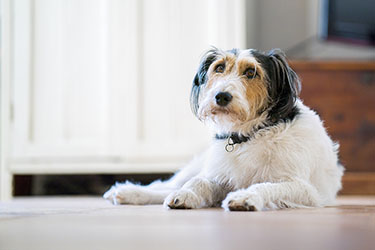Why Is My Dog Eating Poop?

Why Is My Dog Eating Poop and How Do I Stop It?
Dog owners can attest to the amount of weird behavior from their pets, but nothing takes the cake for disgusting habits like eating their own poop. The scientific name for this habit is coprophagia, and it’s actually pretty common in dogs. Cats do it, too, but not nearly as often as dogs.
Eating poop can be tied to behavioral and medical issues, so while it’s not a fun topic to discuss, it’s important for owners to understand why dogs do this and how to stop it.
Medical Reasons
- Enzyme Deficiencies: Your dog’s pancreas produces vital enzymes that help them digest nutrients in their food. If your pet doesn’t have these enzymes, their body can’t properly absorb nutrients and they will be eliminated in their poop. Dogs will eat their own waste (or from other animals) in an effort to obtain these nutrients.
- Parasites: Internal parasites leech nutrients from your dog, which cause your dog to look for those nutrients elsewhere. Not only do parasites cause dogs to eat poop but eating it can also cause internal parasites in dogs — talk about a vicious cycle.
- Poor Diet: A proper diet is vital to your dog’s health. Your dog could be eating too much of the wrong thing, not enough of the right thing and not getting proper nutrients. They also may have problems digesting the ingredients in their food. These problems can lead to increased hunger and nutrient deficiencies, causing them to supplement their diet with waste.
- Other Diseases: Other diseases like diabetes, thyroid malfunction and Cushing's syndrome can cause an increased appetite and, in turn, coprophagia.
Behavioral Reasons
- Boredom: Dogs, particularly puppies, that are left alone all day without any physical or mental stimulation may resort to eating poop as something to do.
- Stress or Anxiety: Commonly seen in dogs that came from a shelter or puppy mill environment, eating waste is a survival technique. If left to go hungry, forced to compete for food, or left with no physical or mental stimulation, dogs will resort to eating their stool.
- Attention Seeking: Our dogs love us and want to get attention from us. If your dog knows that they get attention from you when they do a certain thing, even if it’s negative attention, they may continue to do that thing to get you to notice them.
- Learned Behavior: Mother dogs have been known to clean their pups and even eat their poop in an instinctive effort to “protect the pack” from predators. Young dogs may pick up this behavior.
- Fear: If your dog has been punished (but not corrected in an effective way) for having an accident in the house, they may begin to consume their waste in an effort to “hide the evidence” from you.
Prevent Your Dog from Eating Poop
Many times, the issue your dog may be facing that is causing them to eat their own stool can be a simple fix or correction. Follow these tips to prevent or remedy this gross habit:
- Improve your dog’s diet. Feed them a nutritionally balanced diet that contains human-grade (preferably unprocessed) protein. Consider supplementing with vitamins or digestive enzymes if your dog is having still having trouble getting enough of the nutrients they need.
- Keep your dog’s living area clean and pick up immediately after they go. Be vigilant for other sources of waste, like a cat’s litter box, other dogs or even baby diapers, and prevent your pooch from getting to those.
- Don’t punish your dog for this behavior, as they don’t always associate the punishment with what they did. Instead, work on corrective training and commands like “leave it” or “no” to help them learn what is wrong.
- If your dog is alone for long periods during the day, even in a crate, provide them with plenty to do to keep them stimulated. Toys, puzzle treats or even playing music can help keep them distracted and avoid them finding their own entertainment. Also, make sure to give them plenty of stimulation before they are left alone. Take a longer walk or play fetch before you leave.
- Get your dog checked for parasites regularly. Not only can they cause coprophagia, but parasites can infect a dog that eats poop, so regular screenings will help detect worms early on.
When in doubt, call your veterinary care provider to get their advice and diagnoses on why your dog may be eating their poop. Your veterinarian will be able to discuss the most appropriate remedy or medication for your dog’s specific situation.
Covetrus North American is dedicated to the health of animals. Visit us online or contact your Covetrus representative at 855.724.3461.
Sources:
https://www.petmd.com/dog/wellness/evr_dg_coprophagia_dietary_supplements
https://www.akc.org/expert-advice/health/why-dogs-eat-poop/
https://www.southbostonanimalhospital.com/blog/help-why-is-my-dog-eating-poop
https://www.hillspet.com/dog-care/behavior-appearance/why-do-dogs-eat-poop
https://www.petmd.com/dog/puppycenter/health/evr_dg_why_do_puppies_eat_poop
https://healthypets.mercola.com/sites/healthypets/archive/2018/10/01/coprophagia-in-dogs.aspx
Need Regulatory Assistance
If you need help with regulatory or licensing issues, we're happy to help. We have a wide variety of resources to help you when issues arise.

Careers
Are you looking for a place to let your talents shine? At Covetrus, we help our practitioner customers better serve their patients and take pride in providing the best customer experience possible. Search our open positions to see our available opportunities.
Newsletter
Stay current with what’s going on with Covetrus, subscribe to receive our newsletter and email communications. Subscribers will receive the latest information in practice management, sales and marketing, animal health, and more.


Leave a comment